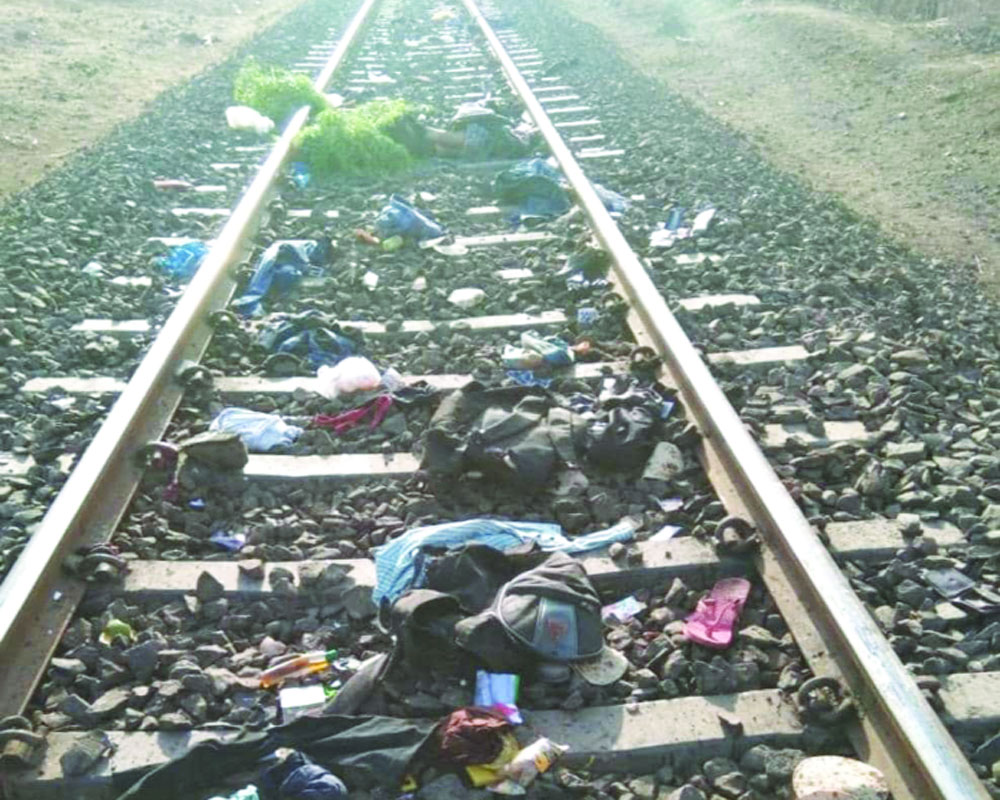Instead of just doles, compile a migrants’ database, employ them in projects depending on location and decentralise units
Images continue to flood us of the reverse migration brought on by the COVID-19 lockdown, the sudden shutdown of economic activity upturning lives and livelihoods to such an extent that even our shock has been dulled into a fatalistic acceptance. Still there is no actionable plan to return, relocate or rehabilitate migrants. Despite the delayed arrangement of trains and buses, the Government continues to be on the backfoot about managing the economic plight of daily wagers who lost jobs and living quarters overnight. So they march on day and night. Without food and water. Stumbling and falling by the highway as they seek emotional succour in going back to their native villages and live off the land than starve to death, unwanted and uncared for. Yesterday, that pattern of brute reality suffered a further jolt. A cargo train ran over migrants in Maharashtra, who fell exhausted after walking miles and decided to sleep on railway tracks thinking no trains would run during the lockdown. It shows the sheer desperation, hopelessness and a surreal wasteland that COVID-19 has reduced the nation and humanity to. Yet the migrants continue to trudge on along railway tracks and highways, waiting to go home as we fly in stranded Indians home in a massively tom-tommed exercise. Still there is no codified plan to engage with the destitute labourers and rehabilitate them productively or dignify them as equal citizens of India. They don’t have money for trains or buses. Without portable ration cards, they cannot avail the Government’s enhanced food allowances except in their villages. And no matter what the guarantees in zones that are operating units or resuming farm operations, they would much rather sign up for MGNREGA work in their home States, which is seeing a commensurate surge. Treated as virus carriers, disinfected brutely with hoses and dehumanised as Stateless people, the migrant workforce — about two crore people are on the move — is not coming back, causing a chronic shortage of labour and slowing down economic revival.
The return of the native story is playing out among non-resident Indians, too. Many of whom have expired work permits and are facing deportation are being evacuated along with stranded Indians abroad. Even NRIs with valid foreign citizenship are homeward-bound, buying up high end property and country homes in India over the last month, hoping to return once normal flights resume. Each country is going to de-globalise, become insular and build self-sufficiencies with own resources and manpower in a post-pandemic world. So immigrant labourers and NRIs are going to bear the brunt in foreign nations and these returnees are going to stress the economy further. With mounting joblessness in our own country, it will be very difficult to accommodate returnees according to their capacities, skilled or unskilled, or even give them a dole. As the Government is under pressure to announce a significant stimulus, just to roll out working capital to medium and smaller industries, this human bulge poses another crisis. Although the Government bungled in anticipating the lockdown impact on the country’s labour capital, it needs to now get a national migrant database going with a thorough mapping of skill sets and capacities. In the event of a future crisis, such data would help in organising and providing assistance to them wherever they are located. Even help relocate them to work sites that are in need of their services. Given the emotional pull of home during the pandemic and the fact that some have already returned, there needs to be a systematic reintegration plan, whereby those that have been lost are replaced by returnees to their home States. As the mass return of migrants becomes a reality, the Government at all levels should have a contingency plan. Though nobody would like to talk about China’s Wuhan, the local government there has engaged labour effectively in mass-producing FMCG items. We can start import substitution units in the long run but in the short run, we can look at lighter industries, like farm produce processing units and packaging. Start-ups helping in cold chain logistics and aggregation can be incentivised and create smart rural and hub economies which can over time ease off the overflow of labour into big cities. Decentralised federalism holds the key not only in politics but in oiling the economy bottom up.
(Courtesy: The Pioneer)








 OpinionExpress.In
OpinionExpress.In















Comments (0)